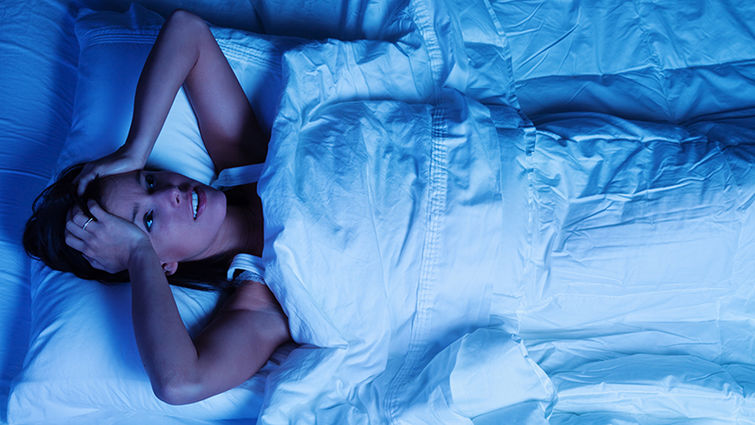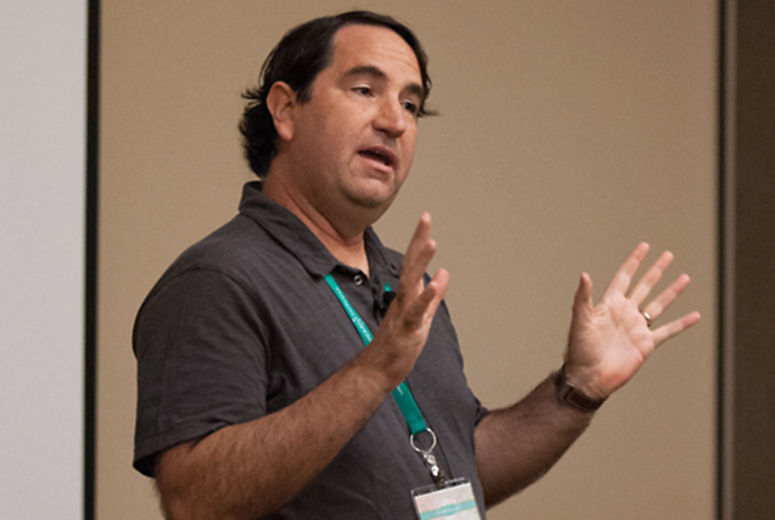
Avoid nights of tossing and turning with these tips
As if the heat weren’t enough, late sunsets, dehydration and pollen allergies can all make sleeping difficult in the summer months.
Keeping one’s bedroom cool and dark, showering to cool down and wash off pollen, and drinking plenty of water can help.
But people can be their own worst enemy when it comes to a good night’s rest, according to Cameron Johnson, MD, a psychiatrist at Loma Linda University Health. The single biggest return on effort for better sleep, Johnson said, is to avoid all electronic screens starting an hour before bedtime.
Johnson delivered a presentation on sleep to a standing-room-only crowd at Loma Linda University Health’s recent 2017 Women’s Conference. Here are seven of his other top tips:
Power down. TVs, computers, smartphones, tablets and e-readers should be turned off and banished from the bedroom. The blue light waves emitted by these devices interfere with the body’s production of melatonin, a natural hormone that helps regulate circadian rhythm. To avoid this, put down your devices an hour prior to your desired sleep time.
Know when to exercise. Staying fit is one of the best things people can do for their well-being, but for the sake of a healthy sleep cycle, the timing is important. Exercising 20 minutes in the early-morning sun helps set your body clock to the right schedule. In the evening, don’t exercise within at least one hour of bedtime; this is the time when you should be winding down.
Prepare your body and your bedroom for rest. They don’t call it body “clock” for nothing; schedule is everything when it comes to getting adequate rest. To signal your body that it will soon be time to fall asleep, create a relaxing bedtime ritual. To complement this, the bedroom should be like a tomb: cold and dark, Johnson said. Cooling caps or blankets can help aid sleep, along with white noise.
BedTIME matters. Bedtime shouldn’t change daily. Hit the pillow within the same half-hour timeframe each night. What time should that be? Johnson recommends getting to sleep by about 10 p.m. Doing so takes advantage of an important window for the delta portion of sleep, which helps the brain lock in the day’s memories, clear toxins, increase energy stores and release growth hormone to repair the body, he said. A 10 p.m. bedtime also protects REM sleep. REM promotes a healthy immune system, improves memory, prevents mood problems and protects nerve cells.
Avoid napping and night shifts. If at all possible, Johnson recommends avoiding overnight shiftwork. To a lesser degree, napping can also wreak havoc on a healthy sleep cycle. Try not to nap, but if you must, do so before 2 p.m. and only sleep 15-20 minutes, he said.
Weigh the benefits and risks of chemical help. Johnson recommends trying to avoid sleep medications that interfere with REM and/or delta sleep — which is most of them, he said. Additionally, taking melatonin can help people fall asleep, but this risks lowering the body’s own natural production of this hormone. Discuss options with a qualified physician. When daytime comes, don’t be fooled by caffeine — it gives a false sense of well-being, Johnsons said. Sufficient sleep is vital for the health of one’s mind and body.
Get tested for a sleep disorder. Sleep apnea, Johnson said, is a huge cause of mental health problems. A sleep study is in order, he noted, for people who have symptoms such as morning headache, fuzzy mind and irritability, as well as family members who snore.
“Don’t be too hard on yourself if you can’t do all of these,” Johnson cautioned.
The best approach to improving sleep habits, he said, is to choose one of these tips and practice it for three months, by which point it will become an unconscious habit. Then repeat with a second change for three months, and so on.
“Don't push yourself too hard,” Johnson said. “Get early wins.”
A pleasant way to start? Get a weekly massage for six weeks, which can improve sleep and cause a cascade of other health benefits, Johnson said.
Sleep Disorders Center at Loma Linda University Health
Approximately 40 million Americans suffer from sleep disorders. The Sleep Disorders Center at Loma Linda University Medical Center can help. Opened in 1982, the center is accredited by the American Academy of Sleep Medicine and treats both adults and children. Call 909-558-6344 to learn more.

